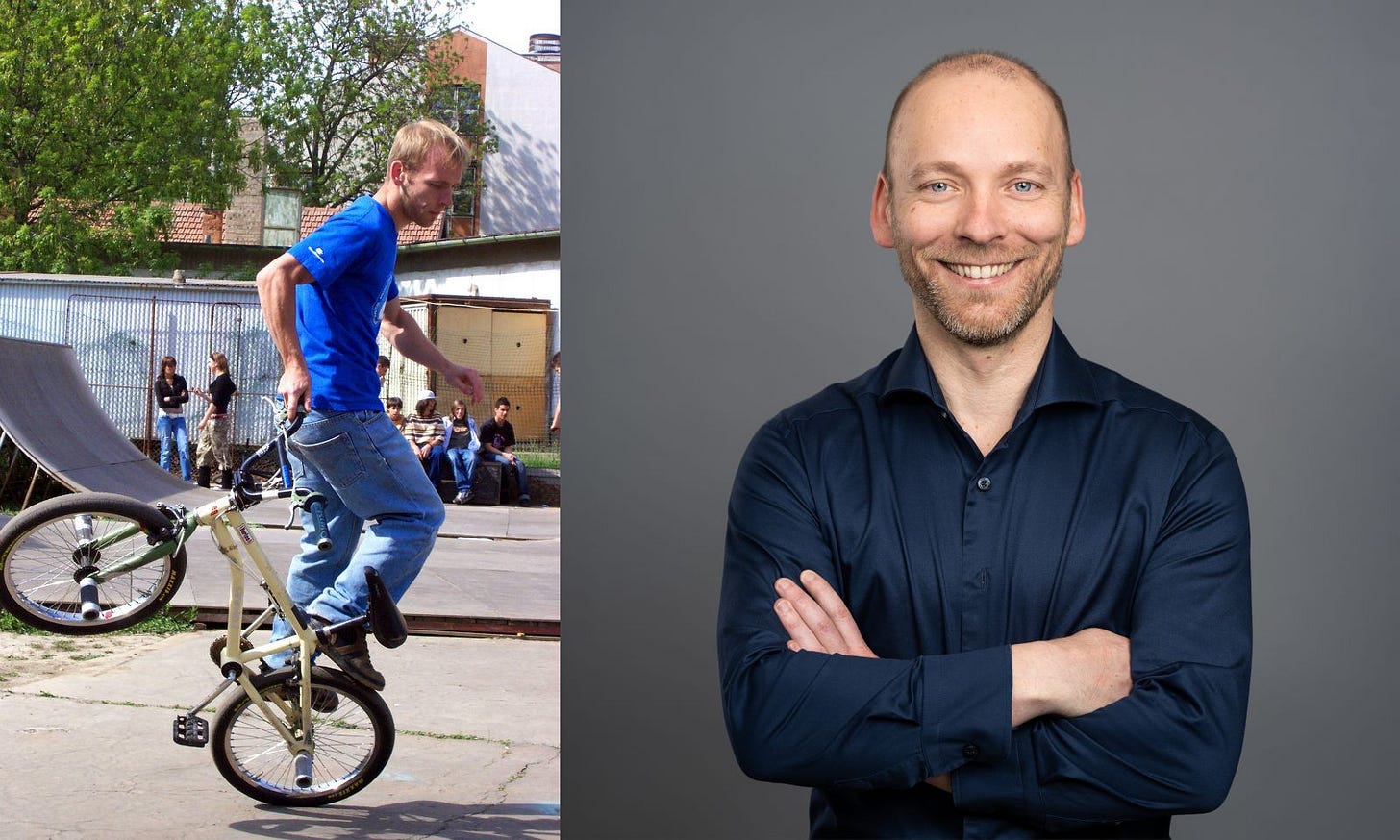A Sticky Note Changed My Career Trajectory: Lessons from Gábor Till
10+ Years of Mentorship, Leadership, and Building Teams That Thrive
In the dynamic world of software engineering and team leadership, Gabor Till has carved out a unique path as a freelance engineering manager and mentor.
From leading large-scale tech transformations to helping individuals navigate career transitions, Gabor’s story is one of resilience, adaptability, and the transformative power of mentorship.
In this interview, Gabor shares the pivotal moments that defined his career, the lessons he’s learned about leadership, and his timeless advice for aspiring engineering leaders.
Whether you’re stepping into a leadership role for the first time or looking to elevate your team’s performance, Gabor’s insights offer both inspiration and actionable wisdom.
“Everyone needs a mentoring experience like I had…”
RT: What life or career moment would you say most defined the leader you are today?
Gabor: I found myself becoming much more interested in team leadership than coding, so I started thinking about what to do with this situation.
What happened was that I wrote down on a yellow sticky note the tasks I was most interested in and the things I would like to try.
It involved things like keeping 1-on-1s, improving processes and things like that.
I then shared this list in a conversation with my then manager.
The answer was that he couldn't offer me such a job, but if I wanted to, he would mentor me to learn these things, so I could help him take on some of his responsibilities.
And this is exactly what happened.
In the following period I learned so much and in such a short time, which was previously unimaginable for me. It saved me years of trial and error.
I've been saying ever since that everyone needs a mentoring experience like that.
“You don’t have to have a leadership title to take on leadership responsibilities.”
RT: It’s funny the butterfly effect of things—a sticky note started it all! Thank you for sharing. You’ve mentored software engineers through various career challenges. What’s one piece of advice you give that’s often surprising to your mentees?
Gabor: Two things come to mind right now.
One is that you don't have to have a leadership title to take on leadership responsibilities.
The other is that you shouldn't think that the work you do will speak for itself. Better to regularly showcase how your work supports company goals.
“Most developers have very vague career goals…”
RT: I completely agree that titles do not make the leader. It’s great to hear validation from you, an accomplished leader in your own right, on that perspective! Sometimes, unconventional advice can be the most impactful. Is there a counterintuitive learning or insight you find yourself sharing often?
Gabor: Most developers have very vague career goals.
These are inherently much better than having no goals at all.
However, if you want to get ahead of the rest, you have to be specific.
When I ask developers what you wish to achieve, many will say I want to strengthen my coding skills.
At least that's a goal, but when and how will you achieve it?
Think about how the following approach gives you a much better chance of achieving your goal and then focusing on the next career move.
"Complete an advanced Java course and build a data analysis project by the end of the next quarter."
“Find the leadership style that suits the individual…”
RT: That’s a great perspective that goals are better than no goals, and specific goals are best. How has working with such a diverse set of talents shaped your views on leadership and teamwork?
Gabor: A good team will always be made up of people from different backgrounds, as this variety brings unique perspectives, skills, and ideas that drive better problem-solving.
This in turn means that as a leader, you must always find the leadership style that suits the individual so that they trust you, and you can bring out the best in them.
I’ve also learned the importance of embracing cultural nuances, as they can significantly influence team dynamics, expectations, and problem-solving approaches.
“Experience is something you can't learn from books or newsletters.”
RT: I love that inclusive approach to embracing cultural nuances—that resonates deeply. In your own career, you’ve held multiple roles across different tech sectors. How do you think this variety has influenced your approach to problem-solving and innovation?
Gabor: I remember relatively many people over the years asking me if it was difficult to find a job, as compared to them, I changed jobs frequently.
Well, as a developer, this was not a problem at all.
But later, as an engineering manager, I had the outstanding advantage of working for companies of different sizes and in different sectors.
I saw set-ups that worked well and even more that, for one reason or another, didn't work as effectively.
Experience is something you can't learn from books or newsletters.
I have brought a lot of experience with me, and it has given me an insight that most people don't have.
“Once we have this clarity…”
RT: That is great perspective that diversity of experiences leads to an advantage in the job market. It makes sense because you end up building so many different skills and learning so much! You’ve led major projects like migrating the Vodafone Enterprise Portal and building in-house teams at Atradius. How do you stay resilient and adaptable when tackling projects of this scale?
Gabor: Large projects inevitably cost the company an enormous amount of money. The goal of these projects should never be for developers to use one framework instead of another.
The key is to be clear about the organizational goals.
Once we have this clarity, all decisions are much easier to make, as they have to serve the ultimate goal.
“We pinpoint the skills and actions necessary to your aspirations.”
RT: Clarity is everything, isn’t it?
Many of your mentees are navigating career transitions and aspiring for leadership. What's your general advice for those navigating transitions and looking to break into people leadership?
Gabor: It all starts with having a written roadmap to your aspirations and the steps you need to take to get there.
We pinpoint the skills and actions necessary to your aspirations.
Basically, you need an ultimate long-term goal, the responsibilities to go with this objective and the short-term goals that lead you there.
“I though we would conquer the world.”
RT: Reflecting on your journey from front-end developer to engineering manager, has your understanding of ‘success’ evolved?
Gabor: Significantly.
At the beginning of my career, I was only interested in making the code I was writing as good as possible, and using as many cool techniques as possible.
I equated success with technical expertise and personal achievements.
Later, as a novice leader, I thought, that if everyone did things the way I would do them, we would conquer the world.
This, of course, did not happen.
After the pivotal mentoring experience mentioned above, success became less about what "I could achieve individually" and more about what "I could enable others to accomplish".
It turned into empowering my team, fostering a positive work environment, and facilitating growth in others.
I learned that true success to me is a reflection of team cohesion and motivation, and the ability to solve problems effectively together.
“Ultimately, soft skills are the backbone of leadership.”
RT: Hah—I can relate to that thinking early in my career too. Embracing differences is key.
You emphasize the importance of soft skills in your coaching. Can you share a time when a soft skill (like empathy, resilience, or communication) made all the difference in a challenging situation?
Gabor: It’s challenging to think of a situation as a leader where soft skills don’t play a crucial role.
Empathy fosters an environment of trust, allowing people to openly share ideas and concerns.
Resilience helps you to stay composed and motivate your teams through difficult moments, and turn challenges into growth opportunities.
Communication ensures that everyone stays aligned, especially in high-pressure situations.
Ultimately, soft skills are the backbone of leadership. They are what turn complex situations into manageable ones.
“Not everything has to be taken seriously”
RT: I completely agree that soft skills are foundational to be a great leader. Because we’re all humans just getting together to do things, and humans are inherently emotional beings.
If you had 1 hour with your younger self just starting their career, what are the top 3 things you would discuss?
Gabor: Well, I was pretty opinionated, so I don't think my then self would have taken my advice.
I think we would just have a chat on the banks of the Danube.
I'd tell myself that everything would be fine.
Just keep being goal-oriented, but take more time to recharge.
Moreover, make sure you write down on that yellow sticky note what you wish to do because the mentoring experience that comes afterwards is what will really get things moving in the right direction.
Gabor Till’s journey is a testament to the power of mentorship, intentional goal-setting, and adaptive leadership.
From coding to managing teams across continents, his focus has always been on growth—both his own and that of the people he leads.
For aspiring leaders, Gabor’s message is clear: embrace mentorship, prioritize soft skills, and always stay aligned with the bigger picture.
Leadership isn’t about titles—it’s about impact.
Want to hear more from Gabor?
P.S. Want reminders on growth, empathy, and leadership? Follow me, Robert Ta, on LinkedIn, Threads, and Twitter.







The yellow sticky note that changed everything - love how the smallest actions, when aligned with our heart's desires, can create the biggest shifts in our path forward.